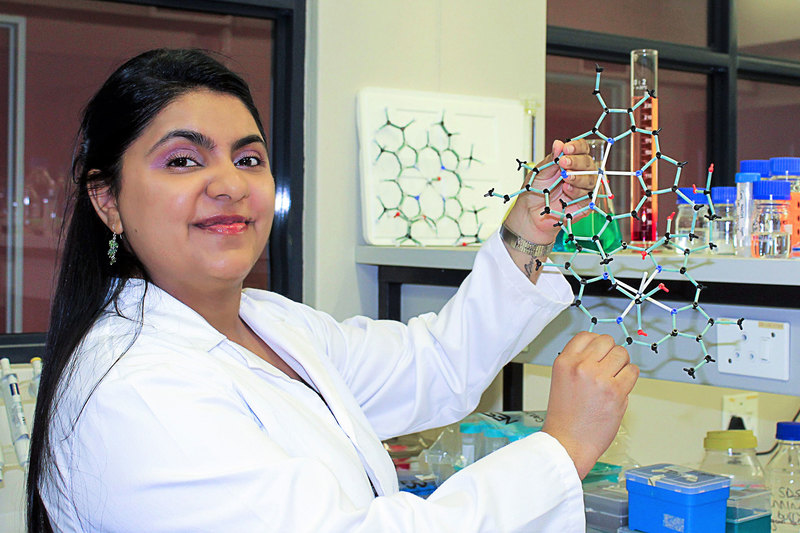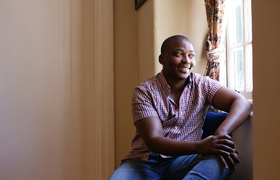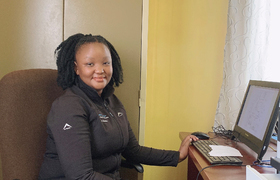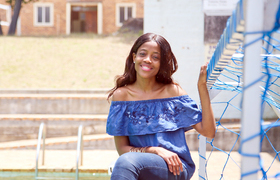Upgraded degree leads to PhD
18 March 2020 | Story Niémah Davids. Photo Supplied. Read time 7 min.
After just a few weeks of residence life and what seemed like endless academic pressures – not to mention several bouts of illness in the first few months – Roxanne Mohunlal was ready to pack her bags and head home to Durban.
Life in the Mother City as a first-year student at the University of Cape Town (UCT) was nowhere near what she had envisioned. The experience was both daunting and overwhelming, and feeling like an outsider in a community where it seemed like everyone else had “figured things out” was not what she had expected.
Roxanne was far from the only support structure she had ever known – her mother and grandparents – and was physically and emotionally drained.
However, the day she received her acceptance letter from UCT to start her undergraduate studies was etched in her memory, and she simply couldn’t forget her mother’s proud face.
“I knew it was the key I needed to unlock a whole new world of possibilities.”
“It was one of the most memorable and happiest days in both our lives. My acceptance at UCT had always been a mere dream,” she said.
So, she persevered.
“Even though my first few months at UCT was one of the toughest transition periods in my life, I knew it was the key I needed to unlock a whole new world of possibilities.”
It’s been an adventure of a lifetime, and has even included an upgraded degree ─ all her sacrifices were worth it.
But unfortunately, her graduation won’t be a conventional one. In light of the national state of disaster in South Africa as a result of the global pandemic, Covid-19, UCT has shut down its campus and suspended all events, including the autumn graduation.
“I am deeply disheartened that grad has been suspended, but I completely understand and hope that the university is open to this being more of a postponement than a cancellation. Graduation is such an important step in our academic journeys,” she said.
ʻShock to the systemʼ
Arriving at UCT was a shock to her system. Everything appeared to be so fast-paced, and everyone seemed to have things figured out – everyone but her.
Roxanne, who described herself as an introvert, said she found it “very difficult” to adapt to university life. Her mom, who was her “rock”, kept her motivated and encouraged her daily to remember the reason she enrolled at UCT – to reshape the trajectory of her life outside her home in Chatsworth, Durban.
It was not an easy thing to do, and as if the move to a new city wasn’t enough, coupled with the school-to-university transition, adjusting to her academic programme was challenging too.
“Initially, I enrolled for a business-related programme, but soon realised that it was not for me. After much deliberation, a year later I decided to enrol for a Bachelor of Science degree, majoring in chemistry and biochemistry,” she said.
Studying science
The change to her academic programme was not at all smooth sailing.
“Having attended an under-resourced public school with no practical exposure to science, UCT appeared to be light years ahead in every aspect,” Roxanne said.
To her, it seemed like most students came from private high schools and affluent backgrounds, equipped with the resources to successfully kick-start their first year in chemistry at university.
“I found most things foreign. My first chemistry practical session was the first time I set foot in a laboratory. It was the first time I was exposed to different glassware, chemicals and actual experiments.”
“My first chemistry practical session was the first time I set foot in a laboratory.”
In fact, even computers were new tools that required added learning on her part.
Slowly things started to change, and the content and practical aspects of chemistry aligned well with her natural curiosity. Soon, she said, she began to thrive in her studies.
“When I realised that I [had] found my vocation, I dedicated most of my free time to learning the basics and to developing a stronger foundation. I spent time pre-reading before lectures and thoroughly engaged with the course content during lectures, tutorials as well as practicals.”
Upgraded degree
She graduated with her undergraduate degree in no time, and in the blink of an eye, she had started her masterʼs in bioinorganic chemistry – a branch of inorganic chemistry that studies the behaviour of metals in living organisms. Her research interrogated the processes crucial for malaria parasite survival in the human body.
Because of the “novel aspects” of her master’s research project, Roxanne’s degree was upgraded to a PhD in 2015.
Her research project focused on investigating the mediators of haemozoin (a by-product formed from the digestion of haemoglobin by certain blood-feeding organisms) formation in the malaria parasite by using an interdisciplinary chemical biology approach.
“One of the major challenges was trying to grasp how a parasite so small can negatively impact human health with such severity.”
What’s unique about her research? Roxanne explained that while haemozoin formation in the malaria parasite is well known, the process is “poorly understood”. Her research unravels mechanistic details about haemozoin formation at molecular level. Using a multi-faceted omics approach, she was able to understand which molecules are responsible for this “crucial” process to occur.
“One of the major challenges was trying to grasp how a parasite so small can negatively impact human health with such severity,” she said.
“In order to find long-term solutions to eradicate malaria, we need to understand the intricate details surrounding malaria parasite biology, which can offer unique and diverse drug targets.”
Magical moments
It’s been a rollercoaster ride.
“My journey has been long and included many excruciating moments, but also many moments filled with absolute contentment and joy. It’s only when we have gone through the most that we can truly appreciate the best,” she added.
Some of the highlights she experienced during her time as a PhD candidate included a research exchange visit to Columbia University in Manhattan, New York; developing as a researcher; presenting her work at local and international conferences and learning innovative chemistry techniques not yet available or established in South Africa.
“It’s only when we have gone through the most that we can truly appreciate the best.”
Currently, Roxanne is a postdoctoral research fellow in UCT’s Department of Chemistry. She said the position nurtures her professional development following her PhD and is strongly research and management focused. She is also involved with teaching undergraduates in the department and is strongly driven by the desire to shape young minds, and to motivate students to persevere despite their harsh challenges.
“As a postdoc fellow I hope to use this experience to gain more clarity regarding my future. I am passionate about change and being part of the solution, so I’d like to be a key role-player in addressing and making changes to global health issues that severely impact the developing world.”
 This work is licensed under a Creative Commons Attribution-NoDerivatives 4.0 International License.
This work is licensed under a Creative Commons Attribution-NoDerivatives 4.0 International License.
Please view the republishing articles page for more information.










